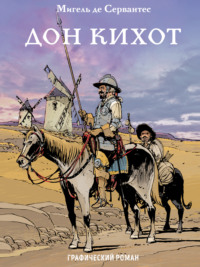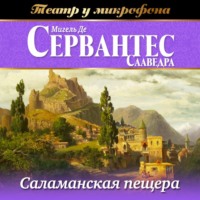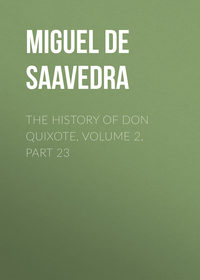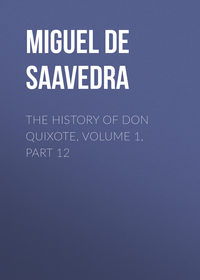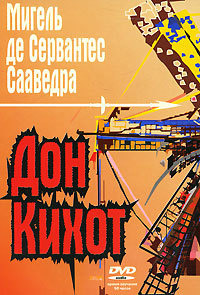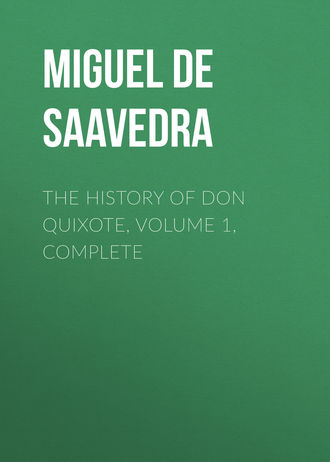 полная версия
полная версияThe History of Don Quixote, Volume 1, Complete
“The command was one that exposed me to the temptation of disobeying it, as it seemed to me impossible to endure life for so many days separated from Luscinda, especially after leaving her in the sorrowful mood I have described to you; nevertheless as a dutiful servant I obeyed, though I felt it would be at the cost of my well-being. But four days later there came a man in quest of me with a letter which he gave me, and which by the address I perceived to be from Luscinda, as the writing was hers. I opened it with fear and trepidation, persuaded that it must be something serious that had impelled her to write to me when at a distance, as she seldom did so when I was near. Before reading it I asked the man who it was that had given it to him, and how long he had been upon the road; he told me that as he happened to be passing through one of the streets of the city at the hour of noon, a very beautiful lady called to him from a window, and with tears in her eyes said to him hurriedly, ‘Brother, if you are, as you seem to be, a Christian, for the love of God I entreat you to have this letter despatched without a moment’s delay to the place and person named in the address, all which is well known, and by this you will render a great service to our Lord; and that you may be at no inconvenience in doing so take what is in this handkerchief;’ and said he, ‘with this she threw me a handkerchief out of the window in which were tied up a hundred reals and this gold ring which I bring here together with the letter I have given you. And then without waiting for any answer she left the window, though not before she saw me take the letter and the handkerchief, and I had by signs let her know that I would do as she bade me; and so, seeing myself so well paid for the trouble I would have in bringing it to you, and knowing by the address that it was to you it was sent (for, senor, I know you very well), and also unable to resist that beautiful lady’s tears, I resolved to trust no one else, but to come myself and give it to you, and in sixteen hours from the time when it was given me I have made the journey, which, as you know, is eighteen leagues.’
“All the while the good-natured improvised courier was telling me this, I hung upon his words, my legs trembling under me so that I could scarcely stand. However, I opened the letter and read these words:
“‘The promise Don Fernando gave you to urge your father to speak to mine, he has fulfilled much more to his own satisfaction than to your advantage. I have to tell you, senor, that he has demanded me for a wife, and my father, led away by what he considers Don Fernando’s superiority over you, has favoured his suit so cordially, that in two days hence the betrothal is to take place with such secrecy and so privately that the only witnesses are to be the Heavens above and a few of the household. Picture to yourself the state I am in; judge if it be urgent for you to come; the issue of the affair will show you whether I love you or not. God grant this may come to your hand before mine shall be forced to link itself with his who keeps so ill the faith that he has pledged.’
“Such, in brief, were the words of the letter, words that made me set out at once without waiting any longer for reply or money; for I now saw clearly that it was not the purchase of horses but of his own pleasure that had made Don Fernando send me to his brother. The exasperation I felt against Don Fernando, joined with the fear of losing the prize I had won by so many years of love and devotion, lent me wings; so that almost flying I reached home the same day, by the hour which served for speaking with Luscinda. I arrived unobserved, and left the mule on which I had come at the house of the worthy man who had brought me the letter, and fortune was pleased to be for once so kind that I found Luscinda at the grating that was the witness of our loves. She recognised me at once, and I her, but not as she ought to have recognised me, or I her. But who is there in the world that can boast of having fathomed or understood the wavering mind and unstable nature of a woman? Of a truth no one. To proceed: as soon as Luscinda saw me she said, ‘Cardenio, I am in my bridal dress, and the treacherous Don Fernando and my covetous father are waiting for me in the hall with the other witnesses, who shall be the witnesses of my death before they witness my betrothal. Be not distressed, my friend, but contrive to be present at this sacrifice, and if that cannot be prevented by my words, I have a dagger concealed which will prevent more deliberate violence, putting an end to my life and giving thee a first proof of the love I have borne and bear thee.’ I replied to her distractedly and hastily, in fear lest I should not have time to reply, ‘May thy words be verified by thy deeds, lady; and if thou hast a dagger to save thy honour, I have a sword to defend thee or kill myself if fortune be against us.’
“I think she could not have heard all these words, for I perceived that they called her away in haste, as the bridegroom was waiting. Now the night of my sorrow set in, the sun of my happiness went down, I felt my eyes bereft of sight, my mind of reason. I could not enter the house, nor was I capable of any movement; but reflecting how important it was that I should be present at what might take place on the occasion, I nerved myself as best I could and went in, for I well knew all the entrances and outlets; and besides, with the confusion that in secret pervaded the house no one took notice of me, so, without being seen, I found an opportunity of placing myself in the recess formed by a window of the hall itself, and concealed by the ends and borders of two tapestries, from between which I could, without being seen, see all that took place in the room. Who could describe the agitation of heart I suffered as I stood there – the thoughts that came to me – the reflections that passed through my mind? They were such as cannot be, nor were it well they should be, told. Suffice it to say that the bridegroom entered the hall in his usual dress, without ornament of any kind; as groomsman he had with him a cousin of Luscinda’s and except the servants of the house there was no one else in the chamber. Soon afterwards Luscinda came out from an antechamber, attended by her mother and two of her damsels, arrayed and adorned as became her rank and beauty, and in full festival and ceremonial attire. My anxiety and distraction did not allow me to observe or notice particularly what she wore; I could only perceive the colours, which were crimson and white, and the glitter of the gems and jewels on her head dress and apparel, surpassed by the rare beauty of her lovely auburn hair that vying with the precious stones and the light of the four torches that stood in the hall shone with a brighter gleam than all. Oh memory, mortal foe of my peace! why bring before me now the incomparable beauty of that adored enemy of mine? Were it not better, cruel memory, to remind me and recall what she then did, that stirred by a wrong so glaring I may seek, if not vengeance now, at least to rid myself of life? Be not weary, sirs, of listening to these digressions; my sorrow is not one of those that can or should be told tersely and briefly, for to me each incident seems to call for many words.”
To this the curate replied that not only were they not weary of listening to him, but that the details he mentioned interested them greatly, being of a kind by no means to be omitted and deserving of the same attention as the main story.
“To proceed, then,” continued Cardenio: “all being assembled in the hall, the priest of the parish came in and as he took the pair by the hand to perform the requisite ceremony, at the words, ‘Will you, Senora Luscinda, take Senor Don Fernando, here present, for your lawful husband, as the holy Mother Church ordains?’ I thrust my head and neck out from between the tapestries, and with eager ears and throbbing heart set myself to listen to Luscinda’s answer, awaiting in her reply the sentence of death or the grant of life. Oh, that I had but dared at that moment to rush forward crying aloud, ‘Luscinda, Luscinda! have a care what thou dost; remember what thou owest me; bethink thee thou art mine and canst not be another’s; reflect that thy utterance of “Yes” and the end of my life will come at the same instant. O, treacherous Don Fernando! robber of my glory, death of my life! What seekest thou? Remember that thou canst not as a Christian attain the object of thy wishes, for Luscinda is my bride, and I am her husband!’ Fool that I am! now that I am far away, and out of danger, I say I should have done what I did not do: now that I have allowed my precious treasure to be robbed from me, I curse the robber, on whom I might have taken vengeance had I as much heart for it as I have for bewailing my fate; in short, as I was then a coward and a fool, little wonder is it if I am now dying shame-stricken, remorseful, and mad.
“The priest stood waiting for the answer of Luscinda, who for a long time withheld it; and just as I thought she was taking out the dagger to save her honour, or struggling for words to make some declaration of the truth on my behalf, I heard her say in a faint and feeble voice, ‘I will:’ Don Fernando said the same, and giving her the ring they stood linked by a knot that could never be loosed. The bridegroom then approached to embrace his bride; and she, pressing her hand upon her heart, fell fainting in her mother’s arms. It only remains now for me to tell you the state I was in when in that consent that I heard I saw all my hopes mocked, the words and promises of Luscinda proved falsehoods, and the recovery of the prize I had that instant lost rendered impossible for ever. I stood stupefied, wholly abandoned, it seemed, by Heaven, declared the enemy of the earth that bore me, the air refusing me breath for my sighs, the water moisture for my tears; it was only the fire that gathered strength so that my whole frame glowed with rage and jealousy. They were all thrown into confusion by Luscinda’s fainting, and as her mother was unlacing her to give her air a sealed paper was discovered in her bosom which Don Fernando seized at once and began to read by the light of one of the torches. As soon as he had read it he seated himself in a chair, leaning his cheek on his hand in the attitude of one deep in thought, without taking any part in the efforts that were being made to recover his bride from her fainting fit.
“Seeing all the household in confusion, I ventured to come out regardless whether I were seen or not, and determined, if I were, to do some frenzied deed that would prove to all the world the righteous indignation of my breast in the punishment of the treacherous Don Fernando, and even in that of the fickle fainting traitress. But my fate, doubtless reserving me for greater sorrows, if such there be, so ordered it that just then I had enough and to spare of that reason which has since been wanting to me; and so, without seeking to take vengeance on my greatest enemies (which might have been easily taken, as all thought of me was so far from their minds), I resolved to take it upon myself, and on myself to inflict the pain they deserved, perhaps with even greater severity than I should have dealt out to them had I then slain them; for sudden pain is soon over, but that which is protracted by tortures is ever slaying without ending life. In a word, I quitted the house and reached that of the man with whom I had left my mule; I made him saddle it for me, mounted without bidding him farewell, and rode out of the city, like another Lot, not daring to turn my head to look back upon it; and when I found myself alone in the open country, screened by the darkness of the night, and tempted by the stillness to give vent to my grief without apprehension or fear of being heard or seen, then I broke silence and lifted up my voice in maledictions upon Luscinda and Don Fernando, as if I could thus avenge the wrong they had done me. I called her cruel, ungrateful, false, thankless, but above all covetous, since the wealth of my enemy had blinded the eyes of her affection, and turned it from me to transfer it to one to whom fortune had been more generous and liberal. And yet, in the midst of this outburst of execration and upbraiding, I found excuses for her, saying it was no wonder that a young girl in the seclusion of her parents’ house, trained and schooled to obey them always, should have been ready to yield to their wishes when they offered her for a husband a gentleman of such distinction, wealth, and noble birth, that if she had refused to accept him she would have been thought out of her senses, or to have set her affection elsewhere, a suspicion injurious to her fair name and fame. But then again, I said, had she declared I was her husband, they would have seen that in choosing me she had not chosen so ill but that they might excuse her, for before Don Fernando had made his offer, they themselves could not have desired, if their desires had been ruled by reason, a more eligible husband for their daughter than I was; and she, before taking the last fatal step of giving her hand, might easily have said that I had already given her mine, for I should have come forward to support any assertion of hers to that effect. In short, I came to the conclusion that feeble love, little reflection, great ambition, and a craving for rank, had made her forget the words with which she had deceived me, encouraged and supported by my firm hopes and honourable passion.
“Thus soliloquising and agitated, I journeyed onward for the remainder of the night, and by daybreak I reached one of the passes of these mountains, among which I wandered for three days more without taking any path or road, until I came to some meadows lying on I know not which side of the mountains, and there I inquired of some herdsmen in what direction the most rugged part of the range lay. They told me that it was in this quarter, and I at once directed my course hither, intending to end my life here; but as I was making my way among these crags, my mule dropped dead through fatigue and hunger, or, as I think more likely, in order to have done with such a worthless burden as it bore in me. I was left on foot, worn out, famishing, without anyone to help me or any thought of seeking help: and so thus I lay stretched on the ground, how long I know not, after which I rose up free from hunger, and found beside me some goatherds, who no doubt were the persons who had relieved me in my need, for they told me how they had found me, and how I had been uttering ravings that showed plainly I had lost my reason; and since then I am conscious that I am not always in full possession of it, but at times so deranged and crazed that I do a thousand mad things, tearing my clothes, crying aloud in these solitudes, cursing my fate, and idly calling on the dear name of her who is my enemy, and only seeking to end my life in lamentation; and when I recover my senses I find myself so exhausted and weary that I can scarcely move. Most commonly my dwelling is the hollow of a cork tree large enough to shelter this miserable body; the herdsmen and goatherds who frequent these mountains, moved by compassion, furnish me with food, leaving it by the wayside or on the rocks, where they think I may perhaps pass and find it; and so, even though I may be then out of my senses, the wants of nature teach me what is required to sustain me, and make me crave it and eager to take it. At other times, so they tell me when they find me in a rational mood, I sally out upon the road, and though they would gladly give it me, I snatch food by force from the shepherds bringing it from the village to their huts. Thus do pass the wretched life that remains to me, until it be Heaven’s will to bring it to a close, or so to order my memory that I no longer recollect the beauty and treachery of Luscinda, or the wrong done me by Don Fernando; for if it will do this without depriving me of life, I will turn my thoughts into some better channel; if not, I can only implore it to have full mercy on my soul, for in myself I feel no power or strength to release my body from this strait in which I have of my own accord chosen to place it.
“Such, sirs, is the dismal story of my misfortune: say if it be one that can be told with less emotion than you have seen in me; and do not trouble yourselves with urging or pressing upon me what reason suggests as likely to serve for my relief, for it will avail me as much as the medicine prescribed by a wise physician avails the sick man who will not take it. I have no wish for health without Luscinda; and since it is her pleasure to be another’s, when she is or should be mine, let it be mine to be a prey to misery when I might have enjoyed happiness. She by her fickleness strove to make my ruin irretrievable; I will strive to gratify her wishes by seeking destruction; and it will show generations to come that I alone was deprived of that of which all others in misfortune have a superabundance, for to them the impossibility of being consoled is itself a consolation, while to me it is the cause of greater sorrows and sufferings, for I think that even in death there will not be an end of them.”
Here Cardenio brought to a close his long discourse and story, as full of misfortune as it was of love; but just as the curate was going to address some words of comfort to him, he was stopped by a voice that reached his ear, saying in melancholy tones what will be told in the Fourth Part of this narrative; for at this point the sage and sagacious historian, Cid Hamete Benengeli, brought the Third to a conclusion.
CHAPTER XXVIII.
WHICH TREATS OF THE STRANGE AND DELIGHTFUL ADVENTURE THAT BEFELL THE CURATE AND THE BARBER IN THE SAME SIERRA
Happy and fortunate were the times when that most daring knight Don Quixote of La Mancha was sent into the world; for by reason of his having formed a resolution so honourable as that of seeking to revive and restore to the world the long-lost and almost defunct order of knight-errantry, we now enjoy in this age of ours, so poor in light entertainment, not only the charm of his veracious history, but also of the tales and episodes contained in it which are, in a measure, no less pleasing, ingenious, and truthful, than the history itself; which, resuming its thread, carded, spun, and wound, relates that just as the curate was going to offer consolation to Cardenio, he was interrupted by a voice that fell upon his ear saying in plaintive tones:
“O God! is it possible I have found a place that may serve as a secret grave for the weary load of this body that I support so unwillingly? If the solitude these mountains promise deceives me not, it is so; ah! woe is me! how much more grateful to my mind will be the society of these rocks and brakes that permit me to complain of my misfortune to Heaven, than that of any human being, for there is none on earth to look to for counsel in doubt, comfort in sorrow, or relief in distress!”
All this was heard distinctly by the curate and those with him, and as it seemed to them to be uttered close by, as indeed it was, they got up to look for the speaker, and before they had gone twenty paces they discovered behind a rock, seated at the foot of an ash tree, a youth in the dress of a peasant, whose face they were unable at the moment to see as he was leaning forward, bathing his feet in the brook that flowed past. They approached so silently that he did not perceive them, being fully occupied in bathing his feet, which were so fair that they looked like two pieces of shining crystal brought forth among the other stones of the brook. The whiteness and beauty of these feet struck them with surprise, for they did not seem to have been made to crush clods or to follow the plough and the oxen as their owner’s dress suggested; and so, finding they had not been noticed, the curate, who was in front, made a sign to the other two to conceal themselves behind some fragments of rock that lay there; which they did, observing closely what the youth was about. He had on a loose double-skirted dark brown jacket bound tight to his body with a white cloth; he wore besides breeches and gaiters of brown cloth, and on his head a brown montera; and he had the gaiters turned up as far as the middle of the leg, which verily seemed to be of pure alabaster.
As soon as he had done bathing his beautiful feet, he wiped them with a towel he took from under the montera, on taking off which he raised his face, and those who were watching him had an opportunity of seeing a beauty so exquisite that Cardenio said to the curate in a whisper:
“As this is not Luscinda, it is no human creature but a divine being.”
The youth then took off the montera, and shaking his head from side to side there broke loose and spread out a mass of hair that the beams of the sun might have envied; by this they knew that what had seemed a peasant was a lovely woman, nay the most beautiful the eyes of two of them had ever beheld, or even Cardenio’s if they had not seen and known Luscinda, for he afterwards declared that only the beauty of Luscinda could compare with this. The long auburn tresses not only covered her shoulders, but such was their length and abundance, concealed her all round beneath their masses, so that except the feet nothing of her form was visible. She now used her hands as a comb, and if her feet had seemed like bits of crystal in the water, her hands looked like pieces of driven snow among her locks; all which increased not only the admiration of the three beholders, but their anxiety to learn who she was. With this object they resolved to show themselves, and at the stir they made in getting upon their feet the fair damsel raised her head, and parting her hair from before her eyes with both hands, she looked to see who had made the noise, and the instant she perceived them she started to her feet, and without waiting to put on her shoes or gather up her hair, hastily snatched up a bundle as though of clothes that she had beside her, and, scared and alarmed, endeavoured to take flight; but before she had gone six paces she fell to the ground, her delicate feet being unable to bear the roughness of the stones; seeing which, the three hastened towards her, and the curate addressing her first said:
“Stay, senora, whoever you may be, for those whom you see here only desire to be of service to you; you have no need to attempt a flight so heedless, for neither can your feet bear it, nor we allow it.”
Taken by surprise and bewildered, she made no reply to these words. They, however, came towards her, and the curate taking her hand went on to say:
“What your dress would hide, senora, is made known to us by your hair; a clear proof that it can be no trifling cause that has disguised your beauty in a garb so unworthy of it, and sent it into solitudes like these where we have had the good fortune to find you, if not to relieve your distress, at least to offer you comfort; for no distress, so long as life lasts, can be so oppressive or reach such a height as to make the sufferer refuse to listen to comfort offered with good intention. And so, senora, or senor, or whatever you prefer to be, dismiss the fears that our appearance has caused you and make us acquainted with your good or evil fortunes, for from all of us together, or from each one of us, you will receive sympathy in your trouble.”
While the curate was speaking, the disguised damsel stood as if spell-bound, looking at them without opening her lips or uttering a word, just like a village rustic to whom something strange that he has never seen before has been suddenly shown; but on the curate addressing some further words to the same effect to her, sighing deeply she broke silence and said:
“Since the solitude of these mountains has been unable to conceal me, and the escape of my dishevelled tresses will not allow my tongue to deal in falsehoods, it would be idle for me now to make any further pretence of what, if you were to believe me, you would believe more out of courtesy than for any other reason. This being so, I say I thank you, sirs, for the offer you have made me, which places me under the obligation of complying with the request you have made of me; though I fear the account I shall give you of my misfortunes will excite in you as much concern as compassion, for you will be unable to suggest anything to remedy them or any consolation to alleviate them. However, that my honour may not be left a matter of doubt in your minds, now that you have discovered me to be a woman, and see that I am young, alone, and in this dress, things that taken together or separately would be enough to destroy any good name, I feel bound to tell what I would willingly keep secret if I could.”



